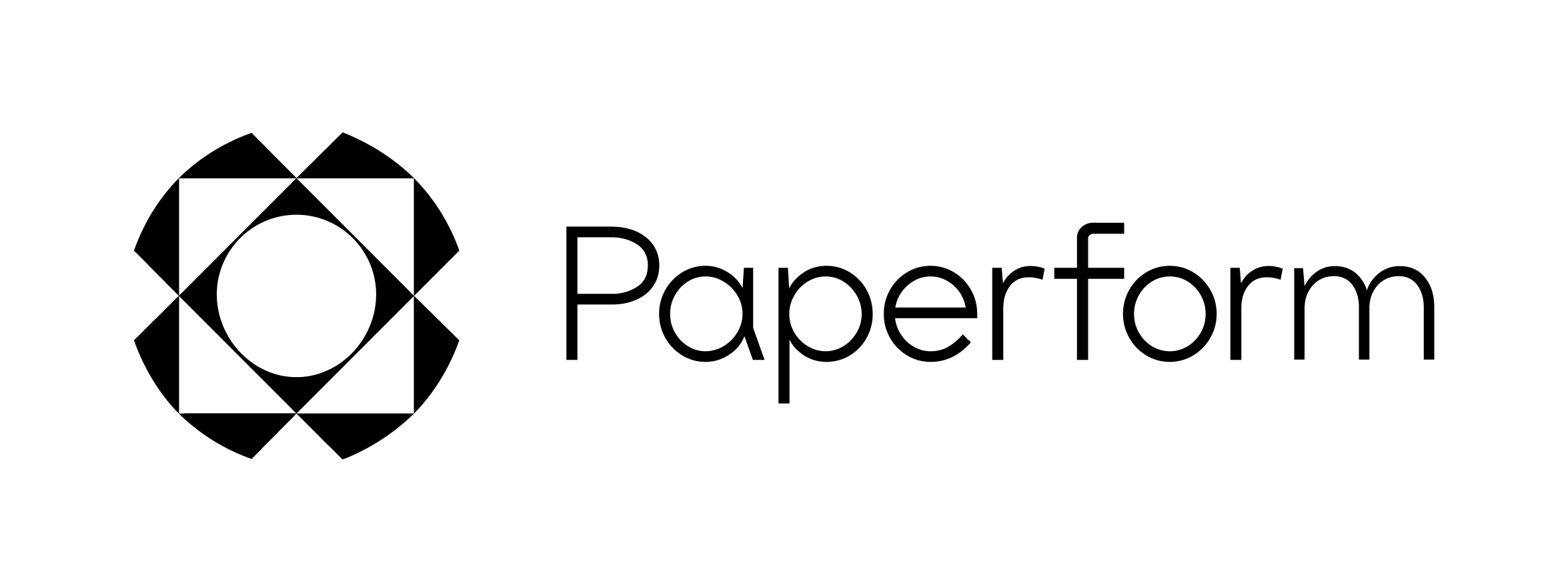
All Solutions
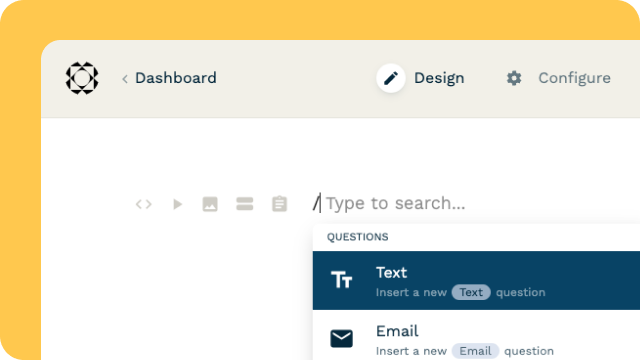
Explore all the solutions you can create with Paperform: surveys, quizzes, tests, payment forms, scheduling forms, and a whole lot more.
See all solutions










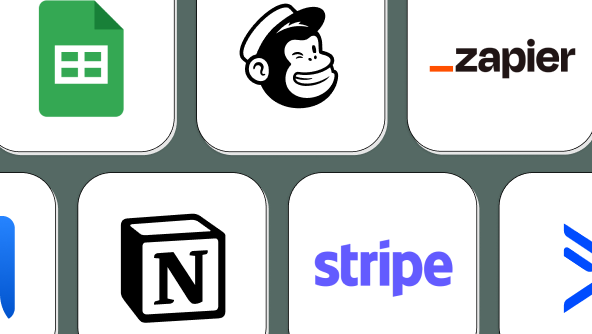
Connect with over 2,000 popular apps and software to improve productivity and automate workflows
See all integrationsSolutions
All Solutions

Explore all the solutions you can create with Paperform: surveys, quizzes, tests, payment forms, scheduling forms, and a whole lot more.
See all solutionsIntegrations

Connect with over 2,000 popular apps and software to improve productivity and automate workflows
See all integrationsResources
Conquering Conflict with Creativity

In our Conversations series we catch up with some of the inspiring charity and Not for profit organisations using Paperform. It's a chance for us to shine a spotlight on important causes and celebrate partnerships we're particularly proud of.
For our inaugural episode, we spoke to Mario Trigueros of Pachamama Alliance.
On this edition of Conversations we chat to Ruth Daniel from In Place of War, a global arts-based charity that uses music and theatre to "conquer conflict with creativity."
Ready to learn more about In Place of War's incredible work? Check out the video or read along with the transcript below. Let's go👇
Editor's note: The transcript has been edited and condensed for clarity.
Alex: Could elaborate for the Paperform community and our users on the ideology and people behind In Place of War?
Ruth: Sure. First of all, thanks for having me. So In Place of War is a global organization that uses the arts and creativity as a tool for positive social change. We work across the world, transforming cultures of violence and suffering into ones of hope, opportunity and freedom.
We’ve been doing this work for around 17 years. The idea started out of a university research question, which was, ‘do people make art when bombs are dropping on their heads? If they do, why is art so important, even in the most challenging times we face as human beings?’
And, of course, we found that art and music are always being made, with only the reasons they are being made slightly differing at times. This work then led us to become connected to this incredible global network of change makers.
These are mostly young people rooted in communities who are using the arts to take people out of gangs; to rebuild communities; rebuild their own futures; to engage people away from violence and even terrorist activities.
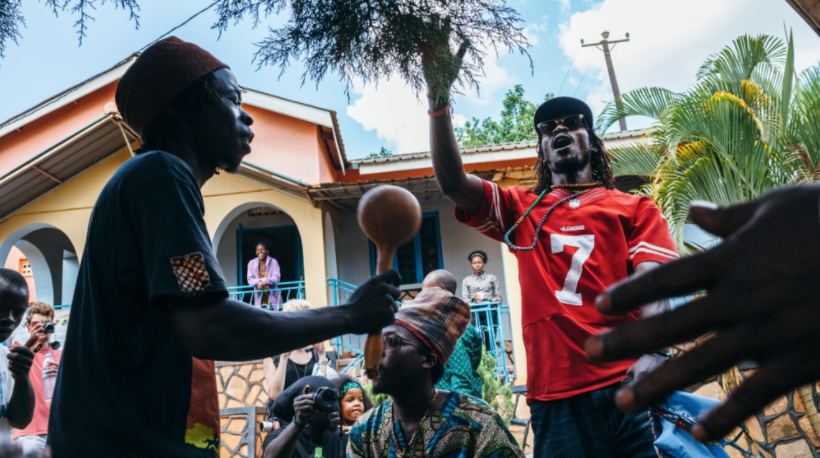 Image via In Place of War
Image via In Place of WarWe found that the arts are a really, really powerful tool on so many levels to do so many things. Also just how important they are to give people the opportunity to think and to express themselves and build the future that they want to see.
So that's the work we do. We work primarily across the Global South in Latin America, Africa and the Middle East and do things like build music studios in war zones, or run creative entrepreneurial programs to help people make a living from their creative talents.
On top of that we give people a global platform to tell their stories using music or theatre or any other art of their choosing as a mechanism to do that.
Alex: I love your credo: “You conquer conflict with creativity”. Art is certainly a unique way to provide support and drive change. Was there a specific situation that made you think about approaching charity through the arts?
Ruth: Well I used to make these music industry events around the world, kind of alternative music industry events called Un-convention.
And it was all about, as music became digital, engaging grassroots and independent musicians and showing them how to do things for themselves, as well as work together on collaborative projects.
We ran these events in various countries in Europe, then took them to Medellín in Columbia, which is a a place that’s been ravaged with a lot of narco-related civil conflict and challenges. What I saw there was music having a completely different purpose.
I’m formerly a musician (a DJ) and love going to gigs and festivals. But in Medellín, these guys said ‘if it wasn’t for hip hop I would be dead. Hip hop gave me another option and I’m truly thankful for that. That moment changed my life. All of a sudden music had this different purpose.
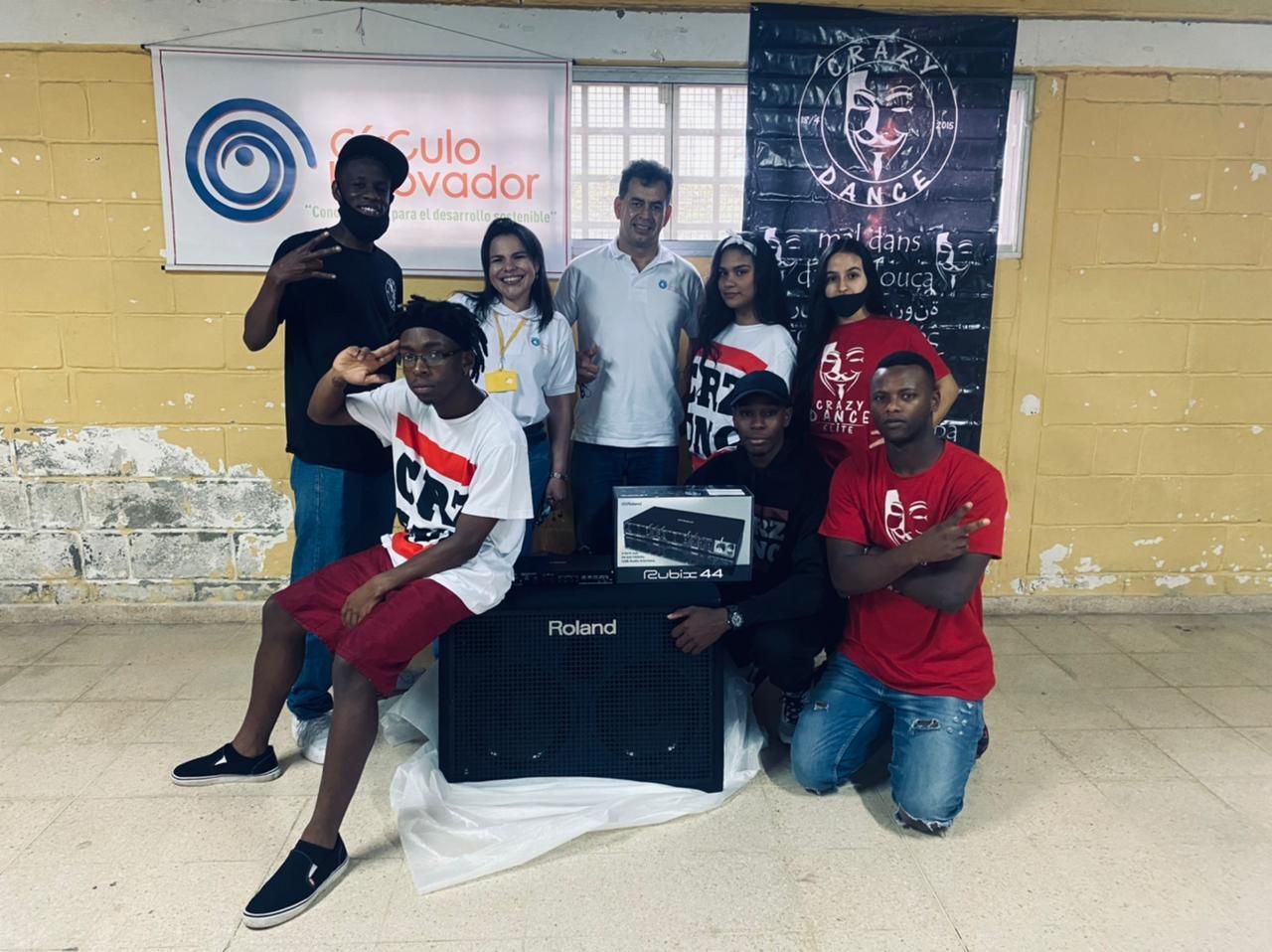 The young people of the San Antonio del Prado district of Medellin use music and dance to build community and create change (via In Place of War Facebook)
The young people of the San Antonio del Prado district of Medellin use music and dance to build community and create change (via In Place of War Facebook)It can do so much more than give people enjoyment. It can change people’s lives and save people’s lives. That moment led me to do a bit more inquiry and see what else is out there around the world. And then I just saw that sentiment resonate and be repeated in Brazil, in Uganda, in Zimbabwe, in all these different places around the world. ‘
It was really profound. Music can do so much more. That’s what led us to create In Place of War. It was myself with this kind of active connection with musicians and people who are using music to change lives, and a professor at the University of Manchester who was really interested in why that was happening.
_A_nd we formed In Place of War together. First as a research project and then as an active organisation that now works with a network of 125 change-makers across 26 countries, who impact millions of people in terms of the way in which they use arts and creativity.
So that was the moment for me. The key moment that changed my thinking, and I guess, my life.
Alex: How much has In Place of War grown since those early days as a research project?
Ruth: So it’s not a huge organisation. The key team is very small, but we work with this huge network of change-makers, and they’re the people who essentially we work for—we deliver what that network wants.
The network itself is made up primarily of young people, rooted in communities that face conflict around the world. When we started out it was only a few of these people around the world and that’s grown and grown and grown.
Particularly in the pandemic, interestingly, it's really grown because we have been organising more things online. We've been able to become connected to people in a sort of different, but actually deeper way.
When we started out we were connected to maybe five countries. We now operate and work in 26. And what I love is that our change-maker network is the core of everything that we do.
They tell us what they want us to do, and we try and make those things happen, whether it be creating music studios, cultural spaces or developing education programs.
Essentially we are there to serve that network of remarkable people who, against all odds, are delivering programs and changing people's lives in situations of real conflict.
Alex: How do you find these change-makers? Did they reach out or are there programs that encourage them to come forward?
Ruth: So it's almost like a network of recommendation. We actually wrote out what the criteria is, but it wasn’t until recently that we really started to think about what it means.
Primarily it’s young people who are using the arts and creativity who are already doing things in their communities and making tangible change that we can see.
A good example of one change-maker is a guy called MC Benny, who is based in the north of Uganda. This is an area that’s been subject to decades of very, very brutal civil conflict, with more than two million people displaced during the conflict there.
Benny wanted to respond when people were able to go back to their communities. He looked around and tried to understand what [resources] he had and what would be possible.
He’s a hip hop artist and he set up something that he calls a ‘Hip Hop Agribusiness,’ which is a hip hop farm. So there are 15 hip hop artists there that work on a farm and grow produce which they sell and make profit on.
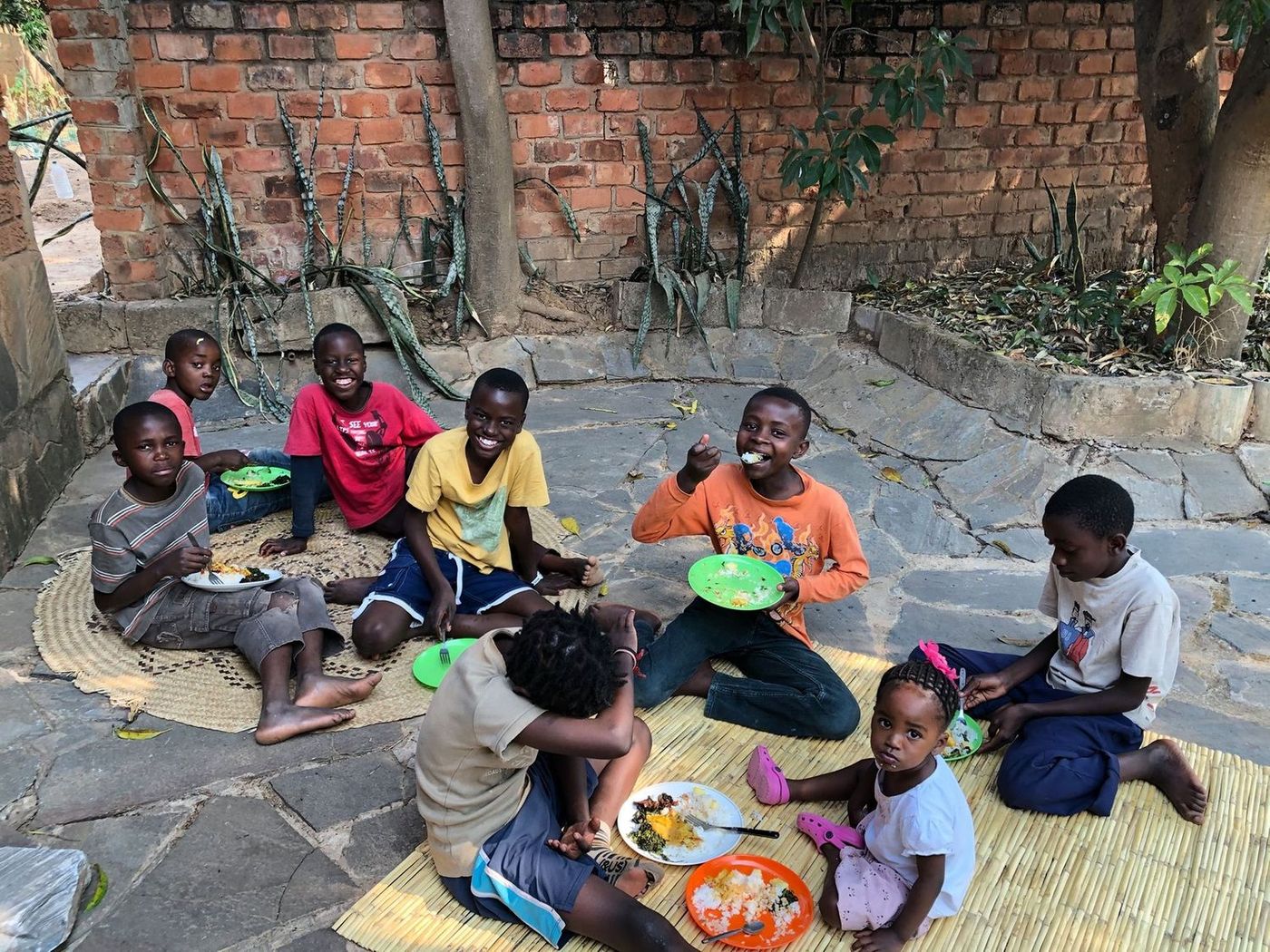 An art farm in action in Zambia (images by @Modziarts via In Place of War Facebook)
An art farm in action in Zambia (images by @Modziarts via In Place of War Facebook)Those profits then enable them to go into the local prison where they deliver hip hop, arts and music workshops with people inside the prison, who in turn, find purpose and tend not to re-offend once they leave.
DJ Benny is just one example of someone who’s using what he has around him to make real change in the community; a brilliant social enterprise, but lacking access to the kind of funding, the ability to be mobilised and learn from other people, for mentoring et cetera.
What In Place of War does is work with people like Benny to establish a huge global network to provide support to that entire network. Working with Benny he’ll then say ‘well there’s a guy in Kenya who’s similar to me’ or ‘a women in wherever’.
The network's grown really organically, essentially through a community of people who want to learn from each other. Who want to share and inspire each other and want to grow the network of this amazing support system all around the world of people using arts and creativity to make change.
And it's really powerful. We have a WhatsApp group and we have a Facebook group and it’s really active. People are sharing what they’re doing every single day. People are learning from each other—we have meetings every week on Zoom.
There’s a real thirst for people wondering how they can make a bigger impact; how they can make a bigger change. It’s brilliant.
Alex: It must be a struggle to handle such a large network with a relatively small team?
Ruth: Yeah, the work feels endless. But the point of our organisation is that if we succeed, then we don’t exist. That’s the idea—we want to conquer conflict with creativity. We want the world to be a more peaceful place and we really value when we can see what these programs have done in communities.
There's a community that we work with in Brazil that introduced a small spoken word, poetry and hip hop space in their favela. And that community, since that's been introduced, has become a really peaceful and safe place where formerly it was a place of violence.
And that's because for the first time there was a place where people from across the community could come together, be creative, share their experiences and transform that community. It's initiatives like that that we want to share and implement.
But the world is a huge place. We are a really small team and we struggle, primarily because the arts is either misunderstood or not spoken about as a mechanism to make change.
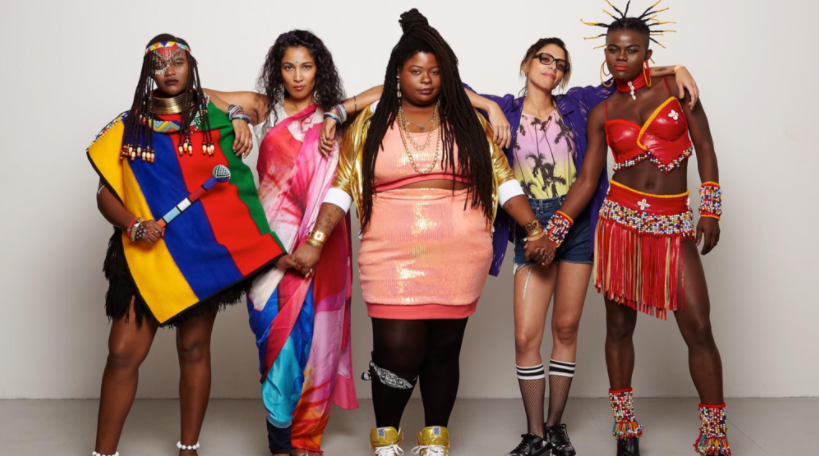 GRRL, an electronic music group brought together by In Place of War
GRRL, an electronic music group brought together by In Place of WarPeople often say to me: ‘well, you're in a war zone, so what about shelter? What about medical supplies? What about food?’
And it’s like, yeah, that’s all valid. But as so many people have said to me who live in these war zones, if they don’t have the opportunity to be creative, what's the point? What's the point of being around? Creativity isn't just about picking up and playing a guitar. It's everything that goes with it.
It's about the people that you meet. The positive role models that you bring into your life. The opportunity to do something creative and express yourself; to imagine a better future and then be able to realise it due to the connections you’ve made and the support network you have. It’s so much more.
So yes, there’s a lot to do. We just try to do what we can and work with these amazing change-maker networks that have the connections. They're in the communities. They have the means to be able to make the change.
For us, it's simply giving them as much support as we can with what they need to be able to do that. To give them the tools and the networks; to work and to mobilise them so they can see the projects and meet with the people; so they have the impact that they want to have in their communities.
Alex: Something else that I noticed is that In Place of War provides support and funding for entrepreneurship. Could you elaborate on that?
Ruth: Yeah. This all came about a few years ago when we were creating events for entrepreneurs in different conflict zones, bringing leaders from around the world to share their insights and deliver workshops.
It was really powerful. But then, of of course, everybody would leave and had to return home. Afterwards we would receive emails from people in saying, “but we need to help in this area.”
We decided to create a creative and social entrepreneurial program that basically built on all the expertise of the amazing people we work with around the world.
So we built this program with hundreds of video resources with the idea that we could train people so they could deliver the program to their own communities. Again, it’s that idea of providing an umbrella of support, building and learning from our network and then sharing that with others.
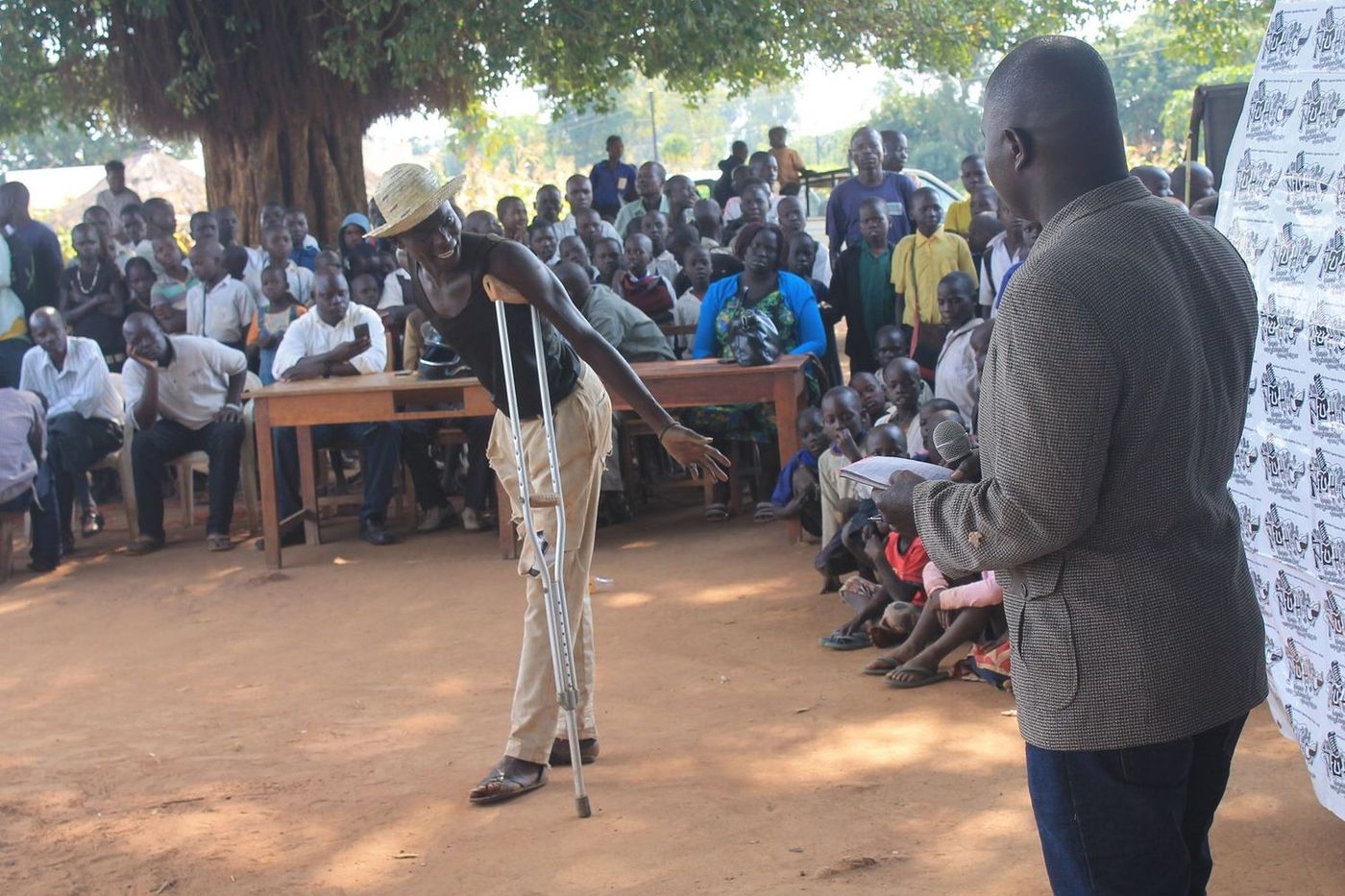 A live event takes place (via In Place of War Facebook)
A live event takes place (via In Place of War Facebook)In creating the program we learned a few things. One of them is that a lot of the people we work with might’t have had access to traditional education. So one of the things that we decided to do was have the program certified by a world-leading university, which in this case was the University of Manchester.
That means if you’re in a township in Uganda and you do our program, you’ll receive a certificate from a university, which is really powerful. But on top of that, the ideas in the programs, and we now have many, are really relevant and aren’t driven by the Global North as it were.
They’re driven by people in those communities who are innovating. Who are doing really amazing things with what they have around them. They look at things like alternative currencies, the idea of creating space, at creative activism.
It’s not your traditional ‘this is how you write a business plan’ kind of idea. It’s really powerful. We’ve now delivered the program in 20 countries in Arabic, Spanish, French and English. The results have been phenomenal. Graduates of our program have set up businesses in everything from fashion and music festivals to dance and cultural space organisations.
For me it’s about the idea of ‘knowledge is power’. But when you’re located in a community that has no Wi-Fi access and is miles away from a town or city, how do you learn? So while the idea started out online we’ve now created a book that we can deliver in places where there’s no Wi-Fi or computers.
Entrepreneurship is all about people defining their own futures. Looking at what they have around them, spotting gaps and finding solutions. It’s a really exciting space to be in. Seeing the solutions that people have come up with has been fascinating.
Alex: How has Paperform helped with these programs and your overall mission?
Ruth: Paperform is something we use all the time, especially when we’re gathering information and speaking to the people that we work with. It’s just amazing.
For us it’s great, because quite often we’re doing stuff on a shoe string budget, so it helps professionalise what we do when we’re doing partnerships. It’s just amazing—and it’s beautiful too.
The last time we used it recently was in a partnership with Roland and Native Instruments, two equipment manufacturers. And we we’re co-ordinating the distribution and donation of equipment across the world. To achieve that we had to gather information from across our network, and we use Paperform to do that.
It just works brilliantly. It’s so effortless and it’s a beautiful platform to collect information for us. We really love working with you guys and thank you.
Alex: No, thank you. It’s rewarding for us to hear. How can people in the wider community get involved today?
Ruth: The best thing to do is to check out our website. Have a look around at what we do, and you’ll also find a space on there where you can contact us.
If you want to get involved in any way we’re really happy to hear from you. As I said before, we’re a really small team, so we’re always open to help whether that’s volunteers or joining our support network. We’re always open to ideas.
We work with loads of volunteers all over the world and we're really happy to hear from people. So feel free to reach out.
Work for an NGO or charity interested in using Paperform? You may be eligible for special not-for-profit pricing.
Deepak (Dee) Shukla, the dynamic founder of Pearl Lemon, built the leading SEO agency in London by l...
Here is the ultimate list of online form builders, what they do best, their pricing, and examples to...
When Luiz Sifuentes lost the platform powering his entire web design business, he rebuilt smarter—wi...
All of our product updates and big company news for Paperform and Papersign from Oct 24 - May 25 to ...